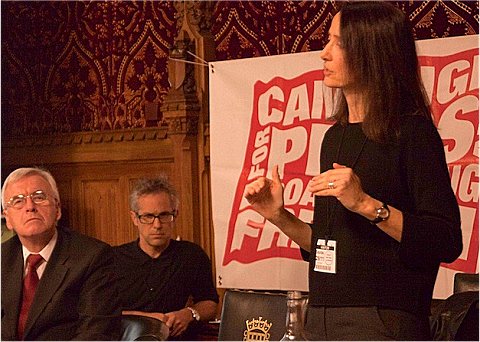for diverse, democratic and accountable media
Best chance of change for a generation
campaigns | media manifesto |
The 2015 UK General Election will be “the best chance we have ever had to produce a manifesto that has some body of support behind it,” the CPBF’s Granville Williams told the launch meeting of the Media Manifesto in London on December 1. “This is about putting media reform back on the political agenda”.
Granville Williams, a veteran campaigner for media reform, said the CPBF had produced Media Manifestos since 1986. “We used to put them out just for the sake of showing what we would like to see in an ideal world because we were frozen out by New Labour. But all that changed in July 2010 when Murdoch decided to get the Tories to help him grab BSkyB. We had a successful campaign against it and that’s part of what we want to create in the run-up to the election.”
Labour MP Chris Bryant, who has endured an extraordinary campaign of smears and abuse from News International papers, said the “idea that the media could NOT be an election issue is incredible. They are an issue because they have made it one.
“I don’t believe in an owners’ press, a proprietors’ press, controlled by a few people,” he said. “If you they want to hack the phones of government ministers, everybody turns a blind eye. I am determined that when it comes to the election we will have a different policy.”Natalie Fenton, a professor of media and a director of the campaign group Hacked Off!, added that the Leveson Inquiry had shown how much fear was spread among politicians by the big media. “There is still a palpable fear among the political parties. They have not hindered the development of the media monopolies. There is still a great deal of anxiety because they fear how they will be reported in the run-up to the election.
“That is why media ownership is at the core of everything. I think this is a doorstep issue. We should force the parties to address it in their own manifestos.”
Her colleague at Goldsmiths College Des Freedman, who is chair of the Media Reform Coalition – with which the CPBF is promoting the Media manifesto –, said the election should be about challenging inequality in Britain, when 1 per cent of the population own more than 55 per cent of them. “There is terrible inequality, including within the media. I don’t see why that should be any different.
“We know that we have the public on our side. The public is way ahead of the newspapers and broadcasters in challenging the terrible inequalities that we have.”
Michelle Stanistreet, General Secretary of the National Union of Journalists, reported that members on national papers who objected to phone-hacking and the conditions under which they had to work had given evidence to Leveson anonymously through the NUJ because they were frightened for their jobs; some were too frightened even to do that.
“When the phone hacking scandal kicked off the owners were concerned solely to protect management and sacrificed the journalists, and that was an eye opener for many journalists.
“Ownership is fundamental,” she said. “We want genuine plurality in the media.”
Paul Evans from the broadcasting union BECTU said he was “calling for a proper free market in the media. The media are not a free market now. Success in the media is about beating the regulators, not commercial rivals.”
He warned of the effect on the economy of further cuts to the BBC, which he said “creates the capacity for high-quality documentaries and other programming that no other country can even dream of. They will kill the golden goose if they cut back again,” he said.Tony Burke, assistant General Secretary of the giant union Unite, told of how the union had been attacked and smeared by the Sun. “And look at the way Ed Miliband was attacked by Associated Newspapers.” He warned: “In the run-up to the election they will do everything they can to sully our name and using everything they can to hit us as hard as they can.”
Showing the range of support for the project, there were also speakers at the meeting in Parliament from Impress, the new independent media regulator; from the Morning Star; from Object, the campaign against media sexism; and from the South East Region of the TUC.Labour MP John McDonnell, a campaign supporter who chaired the meeting, concluded: “Since Leveson they have tried to close down debate on the media but it keeps cropping up again. This could be the best opportunity we have had for a generation.”
DATELINE: 3 December, 2014
Share
